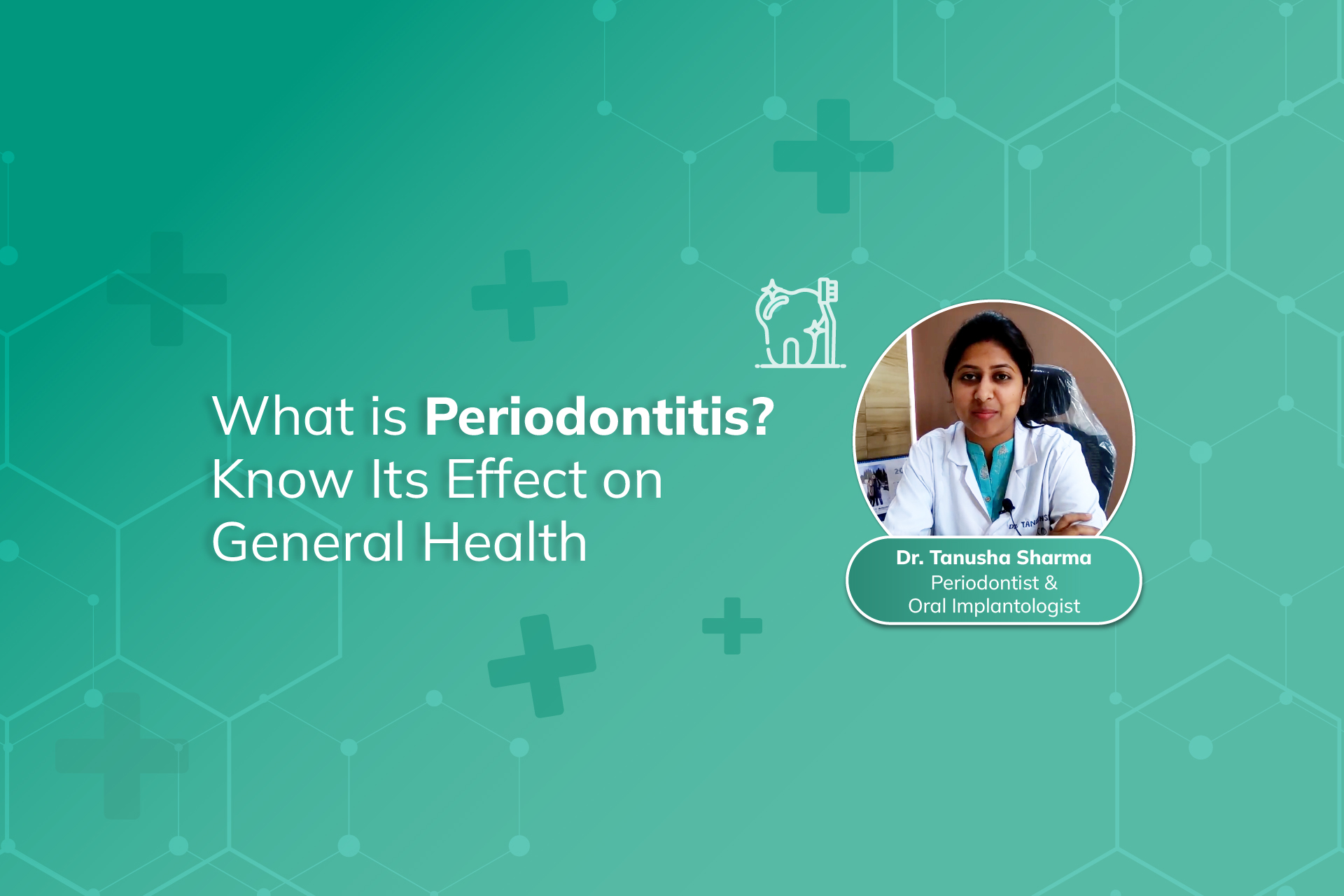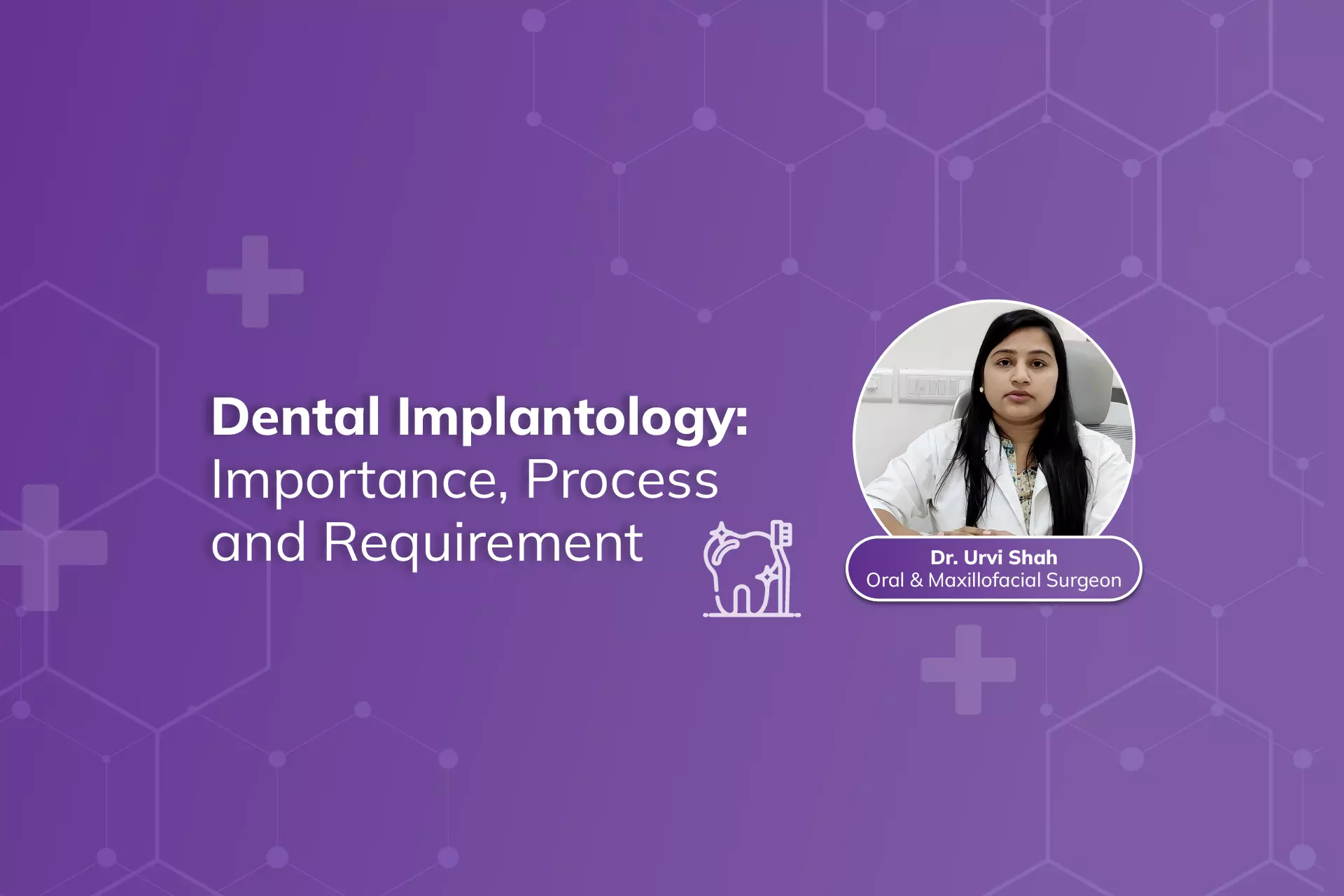Periodontics | 7 min read
What is Periodontitis: Effect on General Health with Dr. Tanusha Sharma
Medically reviewed by
Table of Content
Synopsis
Periodontitis is a bacterial infection that can damage the tissues and bones that support your teeth, leading to tooth loss if left untreated. The article provides several tips on preventing periodontitis with expert tips from famous Periodontist and Oral Implantologist Dr. Tanusha Sharma.
Key Takeaways
- Brush your teeth twice a day and floss daily to remove plaque and bacteria from your teeth and gums
- Regular check-ups and cleanings can help detect and prevent periodontitis.
- Early diagnosis and treatment can help prevent the progression of periodontitis and reduce need for invasive treatment
What Is Periodontitis?
Periodontitis is a type of gum disease that is caused by bacterial infection. It affects the tissues that support the teeth, including the gums, the bone surrounding the teeth, and the ligaments that hold the teeth in place.
It is typically caused by a build-up of plaque on the teeth. Plaque is a sticky film of bacteria that forms on the teeth and can harden into tartar if not removed through proper oral hygiene practices such as brushing and flossing. The bacteria in plaque and tartar can produce toxins that cause inflammation in the gums, leading to the breakdown of the tissues that support the teeth.
As periodontitis progresses, the pockets between the teeth and gums can become deeper, accumulating more bacteria and causing further damage. The gums may also recede, exposing more of the tooth's root and making the tooth more vulnerable to decay and infection.
We interviewed Dr. Tanusha Sharma, Periodontist and Oral Implantologist from Ahmedabad, to understand how to prevent this disease.
Common Symptoms of Periodontitis
Dr. Tanusha said, “If you don’t maintain proper oral hygiene, it can ultimately lead to tooth decay and gum disease. You might not know, but gum disease is the 6th most common disease in the world. Periodontitis is a type of gum disease that can have serious consequences for your oral and overall health.” The symptoms of periodontitis can vary depending on the severity of the disease, but some of the most common symptoms include the following:
- Swollen or tender gums: “Periodontitis usually starts as swollen gums, also known as gingivitis,” said Dr. Tanusha. If your gums are swollen or tender, it may be a sign of periodontitis. Healthy gums should be firm and pink, not swollen or red
- Bleeding gums: Bleeding gums are a common symptom of periodontitis. You may notice bleeding when you brush or floss your teeth, or your gums may bleed spontaneously
- Receding gums: As periodontitis progresses, the gums may start to recede or pull away from the teeth. This can make the teeth look longer than usual and expose the tooth roots, which can be sensitive to hot and cold temperatures
- Loose teeth: “If periodontitis is not treated, the bone and ligaments that support the teeth can become damaged, causing the teeth to become loose or even fall out,” added Dr. Tanusha
- Persistent bad breath: Bad breath, or halitosis, is a common symptom of periodontitis. The bacteria that cause periodontitis can produce an unpleasant odour that lingers in the mouth
- Pus between the teeth and gums: In advanced cases of periodontitis, you may notice pus or other signs of infection between the teeth and gums
- Changes in the way your teeth fit together: As the gums and bone become damaged, your teeth may shift or become misaligned, affecting your bite
If you're experiencing any of these symptoms, it's important to see your dentist as soon as possible. With prompt treatment, it's possible to stop the progression of periodontitis and prevent further damage to your teeth and gums.
How To Diagnose Periodontitis?
There are several ways to diagnose periodontitis, including:
Clinical examination:
A dentist or periodontist can perform a clinical examination to assess the health of your gums and teeth. They will look for signs of redness, swelling, bleeding, and inflammation.
X-rays:
X-rays can help identify bone loss and other structural changes that may indicate periodontitis. These can be useful in detecting the extent of the damage and planning treatment.
Periodontal probing:
This involves using a small instrument called a probe to measure the depth of the pockets between your teeth and gums. Deeper pockets are a sign of periodontitis.
Bacterial testing:
A dentist or periodontist may also use bacterial testing to identify the specific type of bacteria that is causing the infection. This can help guide treatment decisions and improve outcomes.
Genetic testing:
Some genetic tests can help identify genetic markers that are associated with an increased risk of periodontitis. This information can be used to personalize treatment and improve outcomes.
It's important to note that early diagnosis is key to preventing the progression of periodontitis. If you notice any signs of gum disease, such as redness, swelling, bleeding, or bad breath, it's important to see a dentist or periodontist as soon as possible. They can provide an accurate diagnosis and recommend the appropriate treatment.
Periodontitis And Its Effect On General Health
If left untreated, periodontitis can result in tooth loss and other serious health problems.
Periodontitis is more than just a dental problem. Recent research has shown that it's linked to a range of other health conditions, including:
Heart disease:
“Various types of research have proved that there is a link between periodontitis and cardiovascular health,” said Dr. Tanusha. The bacteria that cause periodontitis can enter your bloodstream and cause inflammation in your blood vessels, leading to heart disease. “It can even lead to fatty deposits, which can cause clots and block arteries. This can ultimately cause a heart attack,” added Dr. TanushaDiabetes:
“Periodontitis is directly linked to diabetes,” added Dr. Tanusha. Periodontitis can make controlling your blood sugar levels harder if you have diabetes. This is because the inflammation caused by the disease can make it harder for your body to use insulin effectivelyRespiratory diseases:
The bacteria that cause periodontitis can also enter your lungs and cause respiratory infections like pneumonia
Pregnancy complications:
Women who have periodontitis during pregnancy are more likely to have preterm births and low birth weight babies. “The release of prostaglandins due to periodontitis can cause uterine contractions resulting in preterm births,” said Dr. Tanusha
Arthritis:
There is a link between periodontitis and rheumatoid arthritis. Researchers believe that the inflammation caused by periodontitis may trigger the development of arthritis
Multiple Ways to Prevent Periodontitis
Periodontitis is a serious gum disease that can cause damage to the tissues and bones that support your teeth, leading to tooth loss. Preventing periodontitis is crucial for maintaining good oral health. Here are some ways to prevent periodontitis:
- Maintain good oral hygiene: Brush your teeth twice a day and floss daily. This removes plaque and bacteria from your teeth and gums and helps prevent periodontitis
- Quit smoking: Smoking is a major risk factor for periodontitis. It weakens your immune system and makes it harder for your body to fight off infections
- Manage stress: Stress can weaken your immune system and make it harder for your body to fight off infections, including periodontitis. Find ways to manage stress, such as exercise, meditation, or therapy
- Eat a healthy diet: A diet rich in fruits, vegetables, and whole grains can help prevent periodontitis. Avoid sugary and starchy foods, which can contribute to plaque build-up
- Get regular dental check-ups: Regular dental check-ups and cleanings can help prevent periodontitis by removing plaque and tartar build-up
- Use an antibacterial mouthwash: An antibacterial mouthwash can help kill bacteria and prevent periodontitis. Look for a mouthwash that contains chlorhexidine
- Treat underlying health conditions: Certain health conditions, such as diabetes, can increase your risk of periodontitis. If you have an underlying health condition, work with your healthcare provider to manage it effectively
By following these tips, you can help prevent periodontitis and maintain good oral health.
Dental Treatments For Periodontitis
There are several dental treatments available for periodontitis, depending on the severity of the disease. Here are some common treatments:
- Scaling and root planning: This is a non-surgical treatment that involves removing plaque and tartar from the surfaces of the teeth and roots. It may also involve smoothing the roots to help prevent bacteria from sticking to them. This treatment is usually done under local anaesthesia
- Periodontal surgery: If periodontitis is advanced, surgery may be necessary to remove diseased tissue and reduce the size of the periodontal pockets. Surgery may also involve regenerating bone and tissue that has been lost due to the disease
- Gum grafting: This is a surgical procedure that involves taking tissue from one area of the mouth and using it to cover exposed tooth roots. This can help reduce sensitivity and protect the tooth roots from further damage
- Antibiotics: Antibiotics may be prescribed to treat periodontitis if the infection is severe. They may be taken orally or applied directly to the affected area
- Laser therapy: This is a non-surgical treatment that uses a laser to remove diseased tissue and reduce the size of the periodontal pockets. It can be less invasive than traditional surgery and may also help promote tissue regeneration
“It's important to note that treatment for periodontitis is ongoing and requires a commitment to good oral hygiene habits, such as brushing and flossing regularly and seeing a dentist or periodontist for regular cleanings and check-ups. Your dentist or periodontist will work with you to develop a personalized treatment plan that meets your individual needs and helps you maintain good oral health,” added Dr. Tanusha.
If you suspect that you have periodontitis, it's important to seek treatment from your dentist as soon as possible. Try online doctor consultation on Bajaj Finserv Health to know more about your oral health. Treatment may involve deep cleaning, antibiotics, or surgery, depending on the severity of the disease.
In conclusion, periodontitis is a serious gum disease that can have far-reaching effects on your overall health. By taking steps to prevent the disease and seeking prompt treatment if you do develop it, you can protect your oral and general health.
References
Disclaimer
Please note that this article is solely meant for informational purposes and Bajaj Finserv Health Limited (“BFHL”) does not shoulder any responsibility of the views/advice/information expressed/given by the writer/reviewer/originator. This article should not be considered as a substitute for any medical advice, diagnosis or treatment. Always consult with your trusted physician/qualified healthcare professional to evaluate your medical condition. The above article has been reviewed by a qualified doctor and BFHL is not responsible for any damages for any information or services provided by any third party.





